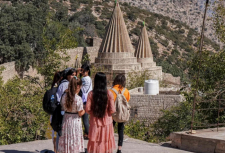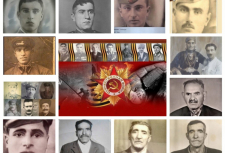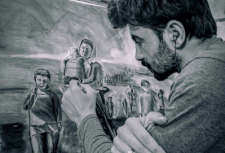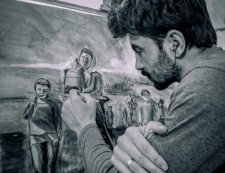Yezidism in Europe Different Generations Speak about their Religion

Preface
Part-2
This adds considerably to our knowledge of Diaspora communities generally, and the Yezidis in particular. However, few research projects so far have focused on the question of what happens to a community’s perceptions of its religion when the surrounding, dominant culture is very different indeed from that of the homeland. Anew concept in the dominant culture of what a ‘religion’ is, has been shown to affect many people’s understanding of their own faith . Community discourse on matters of religion, in short, tends to show deep and fundamental changes under the influence of a new, dominant culture. With a view to answering such questions a research project was initiated, based at the Georg-August University of Göttingen, to conduct qualitative interviews with Yezidis living outside the homelands, aiming to study and compare the discourse on religion of two groups: those whose views of the world and the religion were predominantly informed by the culture of the homelands, and those who were mainly socialized in the Diaspora or absorbed a predominantly Western world-view after their arrival. These groups correspond to some extent to what might be called the older and younger generations of Diaspora Yezidis. Our original intention was to concentrate on Yezidis living in Germany. The arrival in Göttingen of Dr Khanna Omarkhali (Usoyan), a Yezidi Pir from Armenia who lived most of her life in Sankt-Petersburg, offered us an opportunity of comparing developments in Germany with those of another Diaspora community. The method adopted was that of qualitative, largely non-directive interviews, based on a list of questions intended to guide the interviewer, rather than to determine the interview. Informants were asked to respond to questions at length, briefly, or not at all, depending on their interest in the question and willingness to answer it.
Apart from making for a more relaxed atmosphere, this procedure was intended to reduce the risk of obtaining random answers to questions that have little meaning for the informant. The questions were intended to elicit information concerning the worldview of both groups; their understanding of the concept of ‘religion’; and their discourse on questions of religion. An important ai of the project was to discover differences and similarities between these groups in their perception of the Yezidi religion. The opportunity to compare such findings, however tentatively, with those from similar research among the Yezidi Diaspora in the former Soviet Union considerably broadened the scope of the work. It should be stressed that the project focused on community discourse, i.e., the things that can be said among Yezidis in more or less public situations, rather than on wholly private perceptions.
By Philip G. Kreyenbroek in collaboration with Z. Kartal, Kh. Omarkhali, and Kh. Jindy Rashow
Tags:
Yezidism in Europe Different Generations Speak about their Religion

Preface
Part-2
This adds considerably to our knowledge of Diaspora communities generally, and the Yezidis in particular. However, few research projects so far have focused on the question of what happens to a community’s perceptions of its religion when the surrounding, dominant culture is very different indeed from that of the homeland. Anew concept in the dominant culture of what a ‘religion’ is, has been shown to affect many people’s understanding of their own faith . Community discourse on matters of religion, in short, tends to show deep and fundamental changes under the influence of a new, dominant culture. With a view to answering such questions a research project was initiated, based at the Georg-August University of Göttingen, to conduct qualitative interviews with Yezidis living outside the homelands, aiming to study and compare the discourse on religion of two groups: those whose views of the world and the religion were predominantly informed by the culture of the homelands, and those who were mainly socialized in the Diaspora or absorbed a predominantly Western world-view after their arrival. These groups correspond to some extent to what might be called the older and younger generations of Diaspora Yezidis. Our original intention was to concentrate on Yezidis living in Germany. The arrival in Göttingen of Dr Khanna Omarkhali (Usoyan), a Yezidi Pir from Armenia who lived most of her life in Sankt-Petersburg, offered us an opportunity of comparing developments in Germany with those of another Diaspora community. The method adopted was that of qualitative, largely non-directive interviews, based on a list of questions intended to guide the interviewer, rather than to determine the interview. Informants were asked to respond to questions at length, briefly, or not at all, depending on their interest in the question and willingness to answer it.
Apart from making for a more relaxed atmosphere, this procedure was intended to reduce the risk of obtaining random answers to questions that have little meaning for the informant. The questions were intended to elicit information concerning the worldview of both groups; their understanding of the concept of ‘religion’; and their discourse on questions of religion. An important ai of the project was to discover differences and similarities between these groups in their perception of the Yezidi religion. The opportunity to compare such findings, however tentatively, with those from similar research among the Yezidi Diaspora in the former Soviet Union considerably broadened the scope of the work. It should be stressed that the project focused on community discourse, i.e., the things that can be said among Yezidis in more or less public situations, rather than on wholly private perceptions.
By Philip G. Kreyenbroek in collaboration with Z. Kartal, Kh. Omarkhali, and Kh. Jindy Rashow
Tags:


























